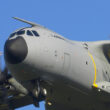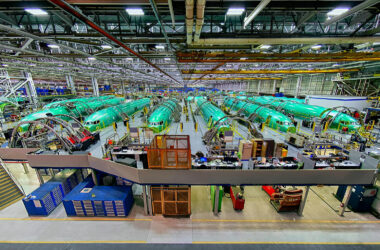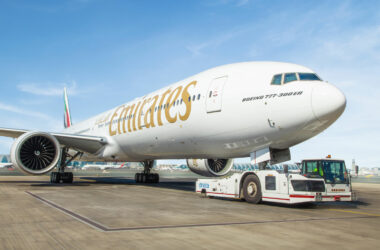With an investment of US$48 million in equipment and systems for training pilots and cabin crew members, Emirates Airline is preparing to receive the new Airbus A350. After several delays, the first aircraft is expected to be delivered in October.
To enable crews to operate the new jets, the Arab airline has acquired three full flight simulators equipped with pilot support systems (PSS), developed in-house by Emirates with the aim of optimizing the training experience. Also part of the package are a fixed-base training device, an emergency cabin evacuation simulator and an entry and emergency door simulator.
Flight simulator receives the highest qualification from EASA
The PSS allows pilots and crew to interactively configure a cabin, including creating a flight plan in a fully immersive environment. Each configuration performed is recalled each time the student returns to the simulator and can be replayed in debrief mode, allowing the instructor to review the pilot’s performance.
This A350 simulator has been awarded a Level D rating, the highest for this type of simulator, by the European Union Aviation Safety Agency (EASA). The second PSS simulator is currently in its acceptance stage and is expected to receive EASA approval in November.

“We’re proud that we now have the potential to expand our pilot training capacity by 54%. With our investments in the new simulators and systems, our pilots and cabin crew are equipped, trained and supremely confident to manage any operational challenge safely and competently,” said Captain Bader Al Marzooqi, Emirates’ Senior Vice President Flight Training.
Thirty pilots and 820 cabin crew have already been trained, and by the end of November, more than 50 pilots will have completed training on the A350 aircraft simulators before it enters service.
Between A350 and 777X, new fleet will have almost 300 jets
Emirates has a total order of 65 A350-900s. After several delays, the first of them made its maiden flight in September. Still with provisional registration F-WGZA, it took off from Airbus facilities in Toulouse, in the south of France, for a flight of almost 4 hours in which it reached an altitude of 41,000 feet over the Atlantic Ocean.
In addition, the company is also waiting for a mix of 205 Boeing 777X aircraft, which are even more delayed than the Airbus and prompted CEO Tim Clark to declare that he would have “serious talks” with the North American manufacturer.






